
Related
Guests
- Steven CorlissUNHCR’s representative in Bangladesh.
- Tun Khinpresident of the Burmese Rohingya Organisation UK. He was born in Burma but in 1982 was rendered effectively stateless along with a million other ethnic Rohingya under a new nationality law.
A major cyclone hits India and Bangladesh amid the pandemic, displacing 3 million people and unleashing heavy rain on Cox’s Bazar, home to 1 million Rohingya refugees, where the first cases of COVID-19 have been confirmed. We get an update from Steven Corliss, United Nations High Commissioner for Refugees representative in Bangladesh, and speak with Tun Khin, a Rohingya activist, president of the Burmese Rohingya Organisation UK.
Transcript
AMY GOODMAN: Right now we’re going to turn directly to Bangladesh. The most powerful storm to hit Bangladesh and India in 20 years made landfall Wednesday, displacing 3 million people and killing at least 20, as COVID-19 cases in the region continue to rise. Cyclone Amphan flooded streets and destroyed homes with more than 100-mile-per-hour winds throughout the night. The storm weakened as it traveled across the coast of Bangladesh, but still unleashed heavy wind and rains on Cox’s Bazar, the world’s largest refugee camp, that’s home to 1 million Rohingya refugees living in crowded and often unsanitary conditions.
The climate change-fueled storm came just days after the first cases of COVID-19 were confirmed in Cox’s Bazar. In a statement released last week, Dr. Shamim Jahan, Save the Children’s health director in Bangladesh, said, quote, “Now that the virus has entered the world’s largest refugee settlement in Cox’s Bazar we are looking at the very real prospect that thousands of people may die from COVID-19. … There are only an estimated 2,000 ventilators in all of Bangladesh, serving a population of 160 million people. In the Rohingya refugee camps — home to nearly a million people — there are no intensive care beds at this moment,” she said.
Well, for more, we’re going to the capital city of Bangladesh, to Dhaka, where we’re joined by Steve Corliss. He’s the representative for the United Nations High Commissioner for Refugees in Bangladesh. Also with us, in London, is Tun Khin, who is a Rohingya activist and president of the Burmese Rohingya Organisation UK and a member of the Free Rohingya Coalition, born in Burma but in 1982 rendered effectively stateless along with a million other ethnic Rohingya under a new nationality law.
We welcome you both to Democracy Now! Let’s begin in Bangladesh. So, you have a million Rohingya, who fled from Burma to Bangladesh, now being hit by these two catastrophes. One is the cyclone, and the other is the pandemic. Steve Corliss, can you talk about what’s happening right now? Steve? Steve? Steve, can you hear me? OK, we’ll try to go to Steve —
STEVEN CORLISS: OK. No, I think — is it better now?
AMY GOODMAN: Yes, Steve, we hear you.
STEVEN CORLISS: OK. I’m so sorry for the technical difficulty.
AMY GOODMAN: Steve Corliss, thanks so much for joining us. Can you respond to what’s happening right now in Bangladesh?
STEVEN CORLISS: Yes. As you said very well, I think, it was an emergency with another emergency layered on top of it. And I think we’ve been quite fortunate in the last 24 hours that the impact of the cyclone on the camp was limited. It passed quite far to the west. Catastrophic impacts for Indians and Bangladeshis living in that region, but only in the camp we experienced limited flooding, the destruction of maybe 100 shelters and the displacement of 400 people. So, we were well able to respond to it, but now we have to get back to the hard business of responding to the COVID-19 pandemic.
NERMEEN SHAIKH: Could you describe, for those who don’t know, what the conditions in Cox’s Bazar are? What are the conditions there?
STEVEN CORLISS: Sure.
NERMEEN SHAIKH: And what are the concerns about how COVID-19 may spread? It was only last week that the first two cases, confirmed cases, were reported.
STEVEN CORLISS: So, you know, we have a population of 860,000 refugees living in just over 20 square kilometers. That’s equivalent to the population of Bhutan. And the other thing to understand is, where they’re living was a forest reserve in August 2017, when they first came to the country. And from that forest preserve, an entire city has emerged. But the crowding is remarkable. The population density is twice what you’d find in Manhattan.
And we have to meet all of their needs. They’re living in very fragile accommodation, I should also say. That’s why we worry when cyclones come into the area, because they simply will not withstand high winds. But in addition to building houses, we have to provide everything for them — water and sanitation facilities, healthcare facilities. And now with the demands of the COVID19 pandemic, we’re racing against time to establish specific, dedicated isolation and treatment centers for the Rohingya refugees and the local Bangladeshis who will need it.
AMY GOODMAN: Tun Khin, if you could join us from where you are in London? You’re president of the Burmese Rohingya Organisation UK. You’ve just heard Steve Corliss on the ground in Bangladesh. What are your major concerns? And for people to understand, why this massive refugee camp, the largest in the world, is even there to begin with?
TUN KHIN: I think we need to look at why these people are there. The first thing is, is that these are genocide survivors — Burmese military and government systematically for many decades, you know, destroying our community. And in 2017, there is about more than 800,000 Rohingya fled. So, today, I think whatever happened here is quite responsible by Burmese government.
And we appreciate Bangladesh government giving us shelter. I think there is much more needed to be done. I mean, like aid groups and Bangladesh government, they are trying. Whatever they can is very — we really appreciated all that. But, you know, in Bangladesh, they are living a kind of a squalid condition. And, you know, this COVID-19 is a big danger; another on top of that, this cyclone. We can see that it’s not much — not much attack to the Bangladesh refugee camps; it’s much more hit to the Bengal, you know, like Kolkata and others. So, our deep sympathies to families and to the victims also.
You know, we are worrying that a bit now after this cyclone, there will be much. You know, there is hygiene. There is no sanitation proper there. A lot of difficulties of health issues will rise up, where we are facing the pandemic, COVID-19, there, same time.
NERMEEN SHAIKH: Steven Corliss, in addition to what you’ve already described as the conditions in Cox’s Bazar, as well as what Tun Khin just said, the Bangladeshi government has also reportedly cut off access to the internet in Cox’s Bazar, and it’s also now reportedly very difficult to get SIM cards, to get cellphones for Rohingya refugees there. Could you explain why the Bangladeshi government did that and what the impact of that has been on letting people in the camp know about the risks of COVID19 and what they should be doing to protect themselves?
STEVEN CORLISS: Thank you. Thank you for the question. The Bangladeshi government explains the basis for the policy as security concerns relating to the cross-border drugs trafficking and trade and other factors in the camp. But it does create difficulties for the humanitarian operation and also for the Rohingya refugees on the ground.
During a cyclone, for example, we need to be able to communicate with our teams in the field. We also need the refugees, who are actually the backbone of the humanitarian response. Refugee volunteers do virtually everything, particularly in a crisis situation. They dig out people who are caught in landslides. They find children who are separated from their families. And they put them in touch with the international actors on the ground. So, the lack of telecommunications is a barrier and is a constraint for us, and we do advocate for the restoration of the internet within the camp.
AMY GOODMAN: The United Nations’ outgoing chief human rights monitor for Burma is calling for an investigation into allegations, Steve Corliss, of ongoing war crimes and crimes against humanity in Burma’s Rakhine and Chin states. Can you talk about what’s happening with the Rohingya who are left in Burma right now, what we’re talking about, something like 600,000?
STEVEN CORLISS: Yeah. Well, I think the first thing to know about the situation on the other side of the border is there’s already an ongoing armed conflict that doesn’t directly involve the Rohingya, between the Arakan Army, which is an insurgent force representing Rakhine Buddhists in that area of the country, fighting against the national armed forces. And the Rohingya in that area tend to be caught a bit in the crossfire there.
UNHCR has an office in Maungdaw. We work on both sides of the border, because UNHCR’s job is to protect refugees, first of all, to let them come to Bangladesh and make sure that they’re able to remain here until it’s safe for them to go home, but also to work on the other side of the border to create the conditions so that they could go back to the place they lived in the past. And this is the first and most important thing to understand about every refugee, is that — and I think Tun Khin would agree with this — that, ultimately, they would want to be home and be safe in their own homes in Rakhine State in Myanmar when that’s possible.
NERMEEN SHAIKH: Tun Khin, in addition, you said, of course, it’s true that Cox’s Bazar has been spared the worst effects of this cyclone, but soon there will be the monsoon season in Bangladesh. Can you explain what the effects of the monsoon have been in Cox’s Bazar, and what you expect to happen, if there have been any safety measures put in place since last summer?
TUN KHIN: As far as what we know, normally, you know, monsoon, landslides and shelters being destroyed. You know, the way how the camps were built up, there is not a kind of proper structural way. So that is a big danger normally, and also the landslide can kill many people. As far as what we know, there is thousands of people are still wrecks of that, landslides wrecks. So, that is one thing we have to keep in our mind.
And, you know, we appreciate Bangladesh government and UNHCR and other aid agencies. Whatever they can, they are doing their best. But I want to bring up here that international community have to do much more to support Bangladesh and aid agencies to improve the situation. So, Bangladesh have had repopulation Bangladesh alone, they can’t take on. We appreciate they’re giving us shelter, but still, Bangladesh could do a lot. Lifting up internet access and others, that would be very important. And also allowing them to get to medical hospital and others, that is very important. But we need to point out the international community should do more.
Rohingyas are one of the most vulnerable peoples on the Earth. You know, that is critical condition now — COVID-19 pandemic, and we are looking at coming up monsoon rainy season, and already Amphan storm, gone away just yesterday, and many things can happen in very few days. This is very important that international community should do much more. We appreciate the international community concern, but have to act seriously, not only supporting Bangladesh and supporting aid to Bangladesh and Rohingya refugees; same time, international community should focus on pressuring Burmese government to restore the rights of the Rohingya, to protect them. Genocide is still ongoing in Burma, where 600,000 Rohingyas’ lives are still at risk in Burma. So, we need to look at Burma is one of the most brutal military regime, and the government, they are continuously doing it. That’s what we need to look at also, same time.
AMY GOODMAN: Tun Khin, we want to thank you so much for being with us, Rohingya activist, president of the Burmese Rohingya Organisation in U.K., member of the Free Rohingya Coalition, born in Burma but in 1982 was rendered effectively stateless along with a million other ethnic Rohingya under a new nationality law. And we want to thank Steve Corliss, speaking to us from Dhaka, Bangladesh, the U.N. High Commissioner for Refugees representative in Bangladesh.
When we come back, we’ll look at how the spread of coronavirus is threatening the health and safety of tens of millions of refugees in camps and outside of camps across the globe. Stay with us.


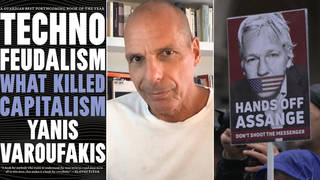
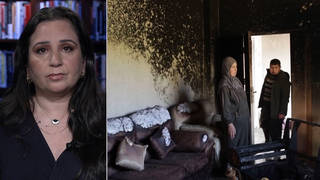
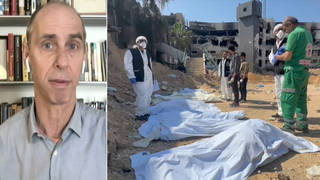





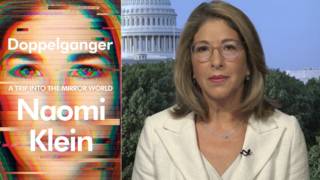
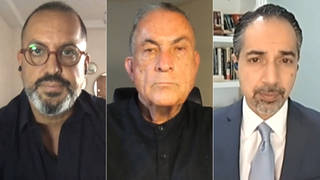
Media Options